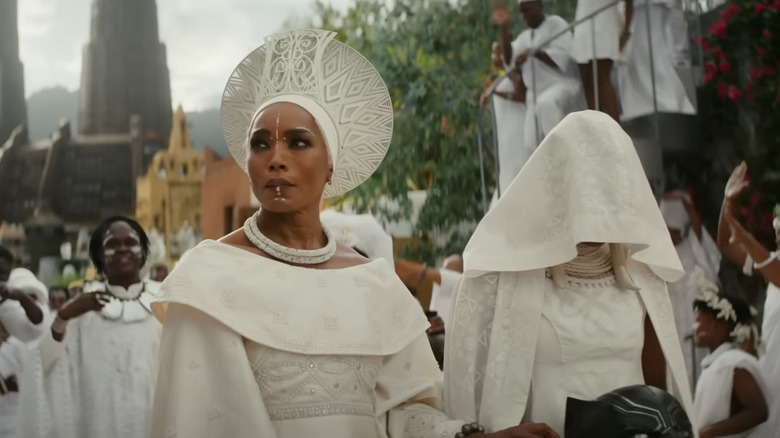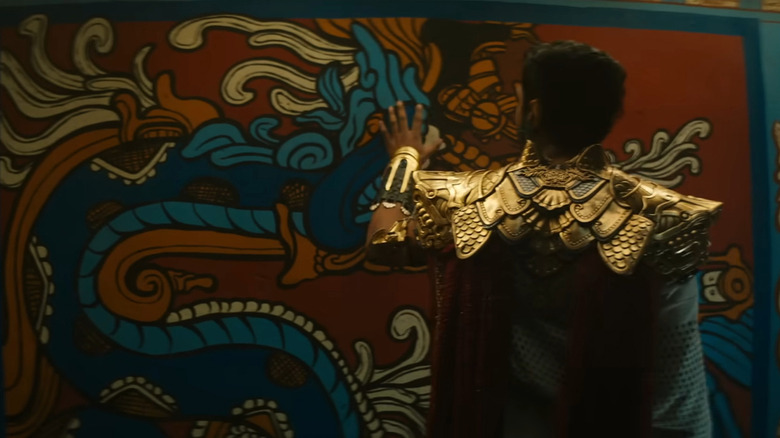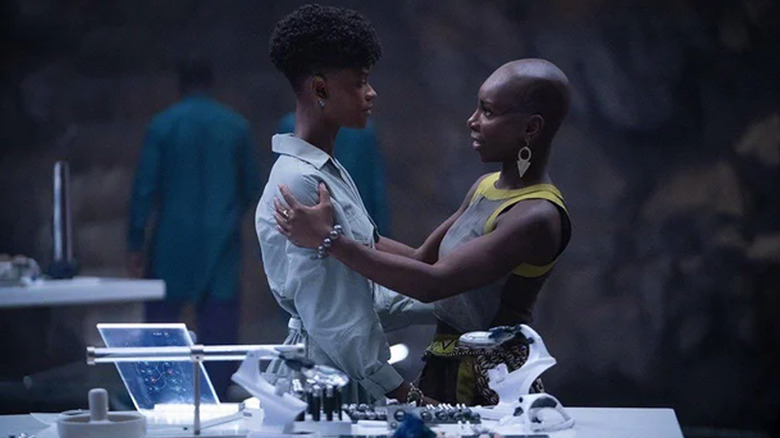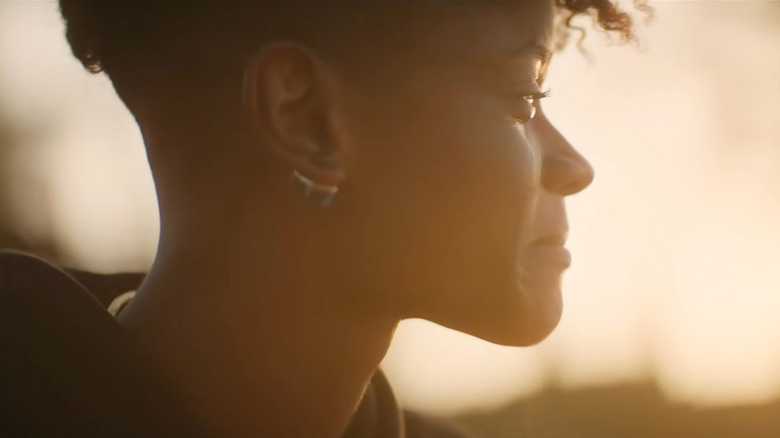
This post contains spoilers for "Black Panther: Wakanda Forever."
The specter of grief casts an undeniable shadow over "Black Panther: Wakanda Forever." With the gravity of Chadwick Boseman's tragic passing in 2020, that was always going to be a given. The cast and crew of the original "Black Panther" grieved the loss of their leading man and close friend throughout the making of the sequel, and it's that grief that informs major elements of "Wakanda Forever."
The film opens with the off-screen death of King T'Challa (Boseman), which causes the returning ensemble to channel their grief into their characters. With Queen Ramonda (Angela Bassettt) mourning the loss of a son, Princess Shuri (Letitia Wright) a brother and mentor, Okoye (Danai Gurira) a leader, etc., art is imitating life. That the majority of the ensemble is — and has always been — comprised of Black women only echoes the tangible burden that most live with every day. It turns "Wakanda Forever" into a time capsule of grief, and as a result, the film travels to dark places — but it refuses to sink within the depths of its own despair. Instead, "Wakanda Forever" explores the process of grief from every angle: the pain of the wound, the anger too, but also the healing that inevitably follows.
The road to restoration is a long and winding one. We may never fully get back to the way things were. But there's still joy at the end of the journey, and it's a sentiment that "Wakanda Forever" makes sure to remind us of.
Life, In Defiance Of Death

It's important to note that, while "Wakanda Forever" does open with a death, it's followed immediately by a celebration of life. The funeral that featured so prominently in the trailers for the "Black Panther" sequel sets the tone for the story to come. And it's a gorgeous scene, no matter how many times you've seen it: With the royal family and the citizens of Wakanda united in their grief, swathed in milky white robes and jewels, their pain (and ours) finds purpose — and in the process, it becomes something beautiful.
It's hard not to revel in the beauty of Wakanda, even while mourning the loss of its king. It's been said that the nation is a character unto itself, and "Wakanda Forever" only doubles down on that concept. The sequel shows us even more of the day-to-day in Wakanda. It shows its protectors — namely Okoye, Nakia (Lupita Nyong'o) and M'Baku (Winston Duke) — living amongst its people. It shows us what they're fighting for, but more importantly, what they're living for. Shuri herself is practically poised to burn the world down after so much loss. It's her love for Wakanda, for its citizens, that brings her back from that precipice.
"Wakanda Forever" also introduces a foil to the nation with Talokan. It, too, was born out of a tragedy: The underwater empire was built by Mayan peoples fleeing colonization on land. But what Namor (Tenoch Huerta Mejía) and his people are able to build in the aftermath is nothing short of spectacular. They survived the death and disease that Spanish colonists brought to the Americas. Their very existence is a celebration of life. To see them thrive against such demoralizing odds — especially with the knowledge of what happened to Mesoamerican civilizations in reality — is as much a manifestation of joy as Wakanda is itself.
The Importance Of Family

Community is another driving force in a film like "Wakanda Forever." With T'Challa gone and Wakanda ostensibly weakened in the eyes of neighboring countries, it only makes sense that those he left behind would rally together. The leaders of Wakanda all take the time to comfort one another, to counsel those that are struggling — but writer-director Ryan Coogler also creates space for some much-needed levity between these characters.
For all the flack that Marvel's lately gotten for its misplaced humor, "Wakanda Forever" really is a funny film. That, of course, has a lot to do with the obvious comedic chops in key members of the ensemble — but so much of its humor is born out of a love and a camaraderie within the cast as well. The sisterhood between Shuri and Okoye, and the new friendship between the women of Wakanda and Riri Williams (Dominique Thorne), breathes life into a story that focuses a lot on loss. It never undermines the emotional journey at hand: If anything, it's a major part of that journey. The path through grief is as much about acknowledging the pain as it is about the pursuit of healing. And as cliched as it sounds, laughter really can be the best medicine.
A New Normal

"Wakanda Forever" is every bit the high-pressure blockbuster that Marvel Studios have made their calling card. But more importantly, it also had to serve as a tribute to the late Chadwick Boseman. Coogler and co. undeniably had their work cut out for them with this project: To complete any film is a feat in its own right, but to do so in the face of such loss — and to channel that loss into a cohesive story — is an incredible task.
Through "Wakanda Forever," we're reminded that death is never the end. It's an acknowledgement of grief, but also a celebration of love, of memory and legacy. It may feel wrong to move on, to find joy in the moments that follow, but it's a natural part of the process. And though we as audiences weren't nearly as close to Boseman as those involved with "Black Panther," "Wakanda Forever" still lets us grieve alongside them every step of the way.
Read this next: 9 Filmmakers Who Should Be Given Free Rein In The MCU
The post Black Panther: Wakanda Forever Isn't Just About Grief — It's About Joy appeared first on /Film.
0 Commentaires